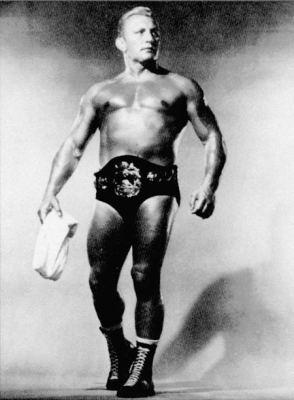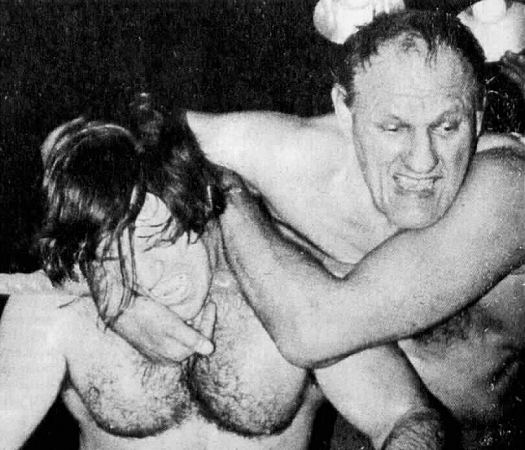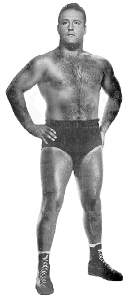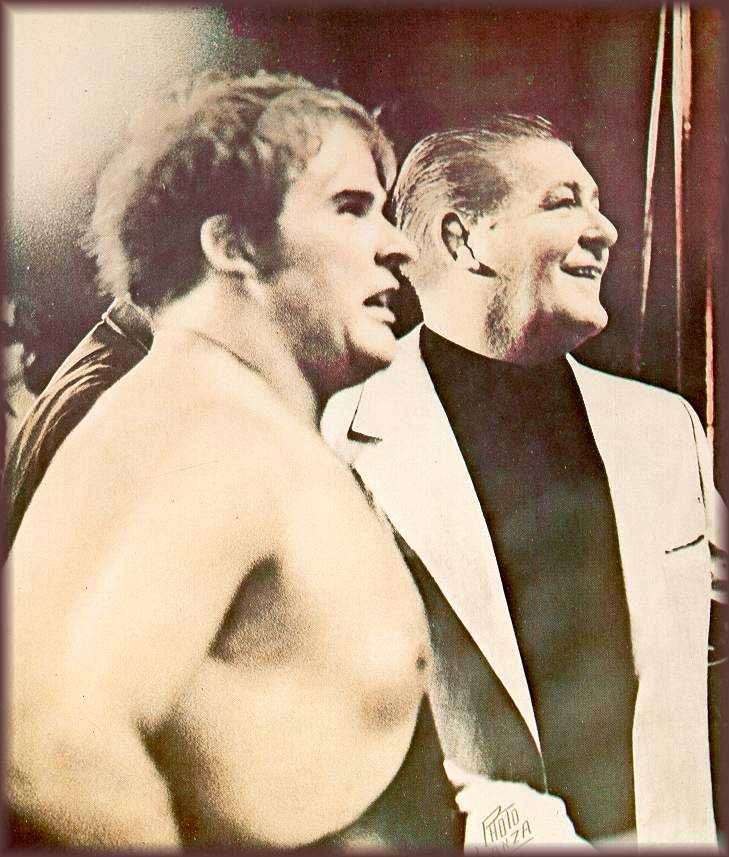|
Disclaimer: The views and opinions expressed in these articles are those of the authors and do not necessarily reflect the official policy or position of Wrestling-Titles.com or its related websites.
When World War 2 ended, everything started to change. Lifestyles would change dramatically and more people would access things that only rich people would afforded before.
Wrestling was about to face those changes. From the basic moves taken from amateur wrestling to win a fight, the sport has taken a radical change: high flying kicks, punches and illegal moves were the standard for wrestlers to win a fight. Mostly the heels and most hated wrestlers used these moves.
In Québec, Yvon Robert was still the star, Eddy Quinn held the promotion to its high standards and new wrestlers were constantly put on the roster. It also opened the doors for new caracters which would revolutionized the look of pro wrestling.

Buddy "Nature Boy" Rogers |

Gorgeous George
and his valet... |
Welcome Gorgeous George, an American who was a sensation every time he passed by. Tagged as a heel, he drew attention by coming into the ring with style: dressed with a satin robe, blond and walking Hollywood style, with a lady valet on its side. Though we thought this guy was doing this for showing off, George could really wreslte and gave a hard time to every dazzled wrestler who faced him. Then came Nature Boy Buddy Rogers, a spectacular high flying wrestler and master of the figure four leglock.
And the heel of heels himself, a brutal wrestler which would set the standard for the genre: Wladek Kowalski.

Killer Kowalski in action,
setting the standard
for ruthless brutality
(Archives) |
The latter would mark the history of pro wrestling in Montéal in one crucial date in 1953. Wrestling against Yukon Eric, a crowd favorite, Kowalski went on the top rope to execute a move on Eric, who was lying down. In his drop, Kowalski's leg came so close to Eric's left ear it ripped off easily. The referee, thinking it was a thing thrown from the crowd, put it in his pocket. But when he saw Yukon Eric bleeding so fiercely on the head's left side and reaching his pocket to discover the damaged ear, the official rang the bell. From that night, two lives would change: Yukon Eric, with a missing left ear, would see his career go down due to several mental breakdowns before his suicide in 1964. Kowaski however lived with the nickname "Killer" until the end of his career...

Maurice Vachon
in
his beginnings before
the Mad Dog Days...
(Archives) |
To prepare for an eventual departure of Yvon Robert, who was close to his 40's, many Québec wrestlers were ready to take his place. Among them an international amateur wrestling champion named Maurice Vachon. After gaining the gold in the British Empire Games in 1950, Vachon then went on to pro wrestling with a unique style of brutality (he said in his autobiography that he was born to brawl) but also of wrestling wits taught by an old pro called Jim Cowley. And of course, Johnny Rougeau, who already organised a few bouts in a sandlot at the Villeray district of Montéal where he grew up. Though he was due to a career in the Coca-Cola Company, his uncle Eddie Auger invited him in 1953 to wrestle in Detroit one night. And that's when Rougeau's career broke off. His brother Jacques, father of the second generation wrestlers that are Raymond and Jacques Jr followed in 1955. With his handsome looks and a style taught by none other than the Champ, Yvon Robert himself, no matter Johnny Rougeau got success everywhere he went. Others Québec wrestlers that went rather for a career in the US are Guy Larose, who wrestled as the German heel known as Hans Schmidt and Camille Tourville, who wrestled in Florida as Tarzan Tyler.

Yvon Robert mangaging
his son Yvon Jr. |
Feburary 1953 will pass as a landmark in the history of Pro Wrestling: the French CBC TV network started to broadcast live wrestling matches from the Montéal Forum on wednesday nights. It was indeed one of the most popular programs ever to be scheduled. These were hosted by the late legendary sports announcer Michel Normandin, and were sponsored by the Dow Breweries (who became later Molson-O'Keefe Breweries).
Finally, the unevitable happened: Yvon Robert retires after a tag team match with Johnny Rougeau in 1957 at Québec City. After officiating matches for two years in the Eddy Quinn promotion, he becomes the manager of Johnny Rougeau itself and brings him to the path of a championship belt in 1961.
.
Next chapter: The 60's: a decline, then a strong rebirth
Copyright © 1999, Productions Leduc 2000
ltd, Montrèal, QC.
|
